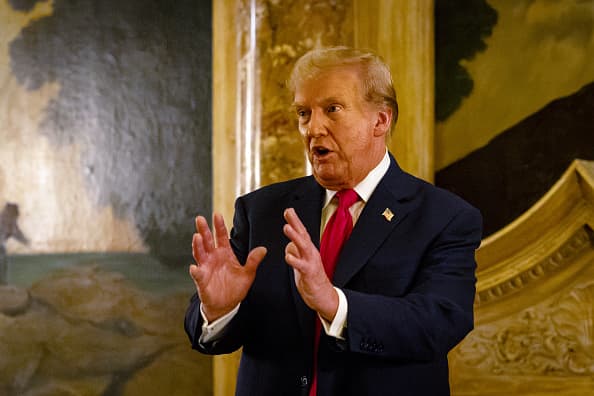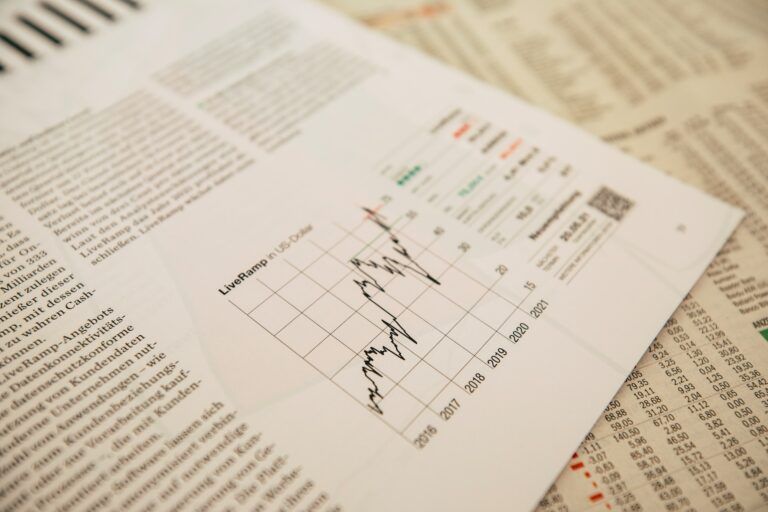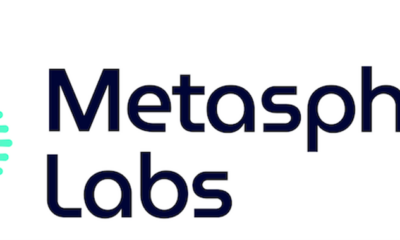Tech
Donald Trump says he wants all future bitcoin to be mined in the U.S.

- Donald Trump says he wants all future bitcoin to be minted in the U.S.
- The proclamation comes after the former president convened a working group of the country’s top bitcoin miners on Tuesday in Mar-a-Lago.
- The coalition included representatives from Riot Platforms, Marathon Digital Holdings, Terawulf, CleanSpark, Core Scientific, Arkon Energy, Cholla Energy and Exacore.
Former U.S. President Donald Trump speaks at a dinner at Mar-a-Lago on June 5, 2024 in West Palm Beach, Florida. Now that his criminal trial in New York has wrapped up, the former president has scheduled a number of fundraising events around the country to aid his presidential bid. (Photo by Eva Marie Uzcategui/Getty Images)
Eva Marie Uzcategui | Getty Images
This past Tuesday night in Palm Beach, Florida, about a dozen bitcoin mining executives and experts sat down with former president Donald Trump for an hour and a half in a small tea room at the Mar-a-Lago Club. As a steady drizzle fell outside, they sipped from Trump-branded water bottles and tried to sell him on the world’s largest cryptocurrency by market capitalization.
The meeting marked the first time the former president and presumptive Republican presidential nominee — recently convicted of 34 felonies in New York — had taken a meeting with the technologists securing the $1.3 trillion bitcoin network.
The intimate gathering brought together a coalition of some of the biggest private and public American miners in the business, including representatives from Riot Platforms, Marathon Digital Holdings, Terawulf, CleanSpark, Core Scientific, Arkon Energy, Cholla Energy and Exacore.
CNBC spoke to half the miners who attended the closed door session on Tuesday, including the CEO of Riot Platforms. Jason Les told CNBC that one of the group’s top talking points was the fact that the U.S. is number one in a lot of things, and it should be number one at bitcoin, especially as the world’s top coin touches new all-time price highs this year. Bitcoin is up 160% to around $67,000 since June 2023.
Senator Bill Hagerty (R-Tenn.) — who is the ranking member on the Senate’s Banking Committee and Finance Subcommittee, as well as a vocal proponent of the digital asset industry broadly, and bitcoin mining in particular — was also there to help guide what participants described as a free-flowing and wide-ranging discussion on bitcoin, energy, job creation and the push to beat China in the artificial intelligence arms race.
Many agreed that the former president was collaborative, had well-informed questions and seemed genuinely interested in how bitcoin miners could help solve America’s energy deficit problem.
BTC Inc. CEO David Bailey, who organized the mining sit-down with Trump, says that the meeting is part of a larger push to support the former president’s bid to return to the White House.
“Our industry intends to make bitcoin and crypto a defining issue for the 2024 election,” Bailey said of the effort. “As an industry we are committed to raising over $100 million and turning out more than 5,000,000 voters for the Trump reelection effort.”
Less than four hours after Trump’s roundtable wrapped, the former president took to social media to extol the virtues of the bitcoin mining business.
“Bitcoin mining may be our last line of defense against a CBDC,” Trump posted shortly before midnight on Tuesday.
“Biden’s hatred of Bitcoin only helps China, Russia, and the Radical Communist Left. We want all the remaining Bitcoin to be MADE IN THE USA!!! It will help us be ENERGY DOMINANT!!!”
Bitcoin and some other cryptocurrencies are created through a process known as proof-of-work, in which miners around the world run high-powered computers that collectively validate transactions and simultaneously create new tokens.
The process requires heaps of electricity, leading miners to seek out the cheapest sources of power. Many have begun to set up shop in the U.S. in the last few years, much to the chagrin of a mix of mostly Democratic lawmakers, including Sen. Elizabeth Warren (D-Mass.).
“It’s such an easy issue for politicians,” in part because there is “no major ask that we have to change the rules or anything else,” Les, who runs a bitcoin mining company with a market cap of about $3 billion, told CNBC.
“We just want to be treated like everyone else,” Les added, noting that more than one in four people in the U.S. now owns bitcoin, according to a survey recently conducted by bitcoin financial services firm Unchained.
For months, Trump — who recently launched his latest non-fungible token collection on the solana blockchain in April — has been making increasingly bullish comments on crypto.
He is now accepting digital currency donations and has pledged to defend the rights of those who choose to self-custody their coins, meaning that they don’t rely on a centralized entity like Coinbase to hold their tokens and instead, do it themselves in personal crypto wallets, which are sometimes outside the reach of the Internal Revenue Service. Trump also vowed at the Libertarian National Convention in Washington in May to keep Sen. Warren and “her goons” away from bitcoin holders.
In early June in San Francisco, technologists, crypto executives, and venture capitalists paid up to $300,000 per ticket to join a Trump fundraiser that ultimately raised more than $12 million.
And then on Tuesday, Trump declared that all future bitcoin will be minted in the U.S., should he return to the White House.
Geoff Kendrick, who heads up digital assets research at Standard Chartered, recently wrote that he expects bitcoin to reach the $100,000 price threshold as the U.S. approaches the November presidential election and $150,000 by the end of the year if Trump wins.
Read more about tech and crypto from CNBC Pro
Decentralization is a key feature of bitcoin, because it means the network isn’t controlled by any entity and can’t be shut down — even if a government disapproves. Roughly 37% of the bitcoin network’s miners are located in the U.S., with China closely following at 21% of bitcoin’s global processing power despite Beijing banning the practice in 2021.
“He wants to keep all of the remaining bitcoin mining in the U.S. and out of China,” Matthew Schultz, CleanSpark’s executive chairman and director, who attended the Mar-a-Lago working group, told CNBC. “For him to be legitimately engaged in the bitcoin industry, and understanding the way that mining works, was really awesome.“
The group also touched on doing more to support U.S.-made ASICs, short for Application-Specific Integrated Circuits, which are the purpose-built rigs used to mine bitcoin. Most ASICs are built in China, but Auradine is a U.S.-based startup that is manufacturing this equipment.
Jayson Browder, senior vice president of Government Affairs at Marathon Digital Holdings, said that he brought one of these machines to show Trump to highlight the significance of “bringing chips manufacturing back to the U.S.”
The emphasis on protectionist policies that safeguard domestic manufacturing echoes the former president’s “America First” economic agenda.
Trump also expressed concern over the U.S. launching a central bank digital currency, or CBDC — that is, a digital coin issued by the Federal Reserve that could grant the government greater access to personal spending data.
Bitcoin is seen by many in the industry as the antithesis of a CBDC because it is a censorship-resistant and borderless currency that is not centrally issued, nor constrained by geographic or governmental boundaries. Trump wrote that bitcoin mining may be the “last line of defense against a CBDC.”
When asked about the Tuesday evening meeting, Brian Hughes, senior advisor to the Trump administration, told CNBC that “crypto innovators and others in the technology sector are under attack from Biden and Democrats” and that “while Biden stifles innovation with more regulation and higher taxes, President Trump is ready to encourage American leadership in this and other emerging technologies.”
Trump’s pro-crypto campaign platform comes as polling data shows that crypto matters more to the voting public now than in past presidential elections. A Harris poll funded by the spot bitcoin ETF issuer Grayscale found that one in three U.S. voters will consider a candidate’s crypto stance before casting a ballot.
Bitcoin has also seen its place as an asset class solidified in the traditional financial markets through the adoption of spot bitcoin exchange-traded funds. Since launching in January in the U.S., these funds have collectively brought in roughly $60 billion in assets under management as institutions and an entirely new set of investors gain exposure to the digital asset class for the first time.
So far this year, crypto-friendly venture capital firm Andreessen Horowitz; centralized crypto exchange Coinbase; veteran venture capitalist Ron Conway; venture capital executive Fred Wilson; tech executives Cameron and Tyler Winklevoss; and Ripple, a crypto solutions business, have all donated tens of millions of dollars to Fairshake, according to the pro-crypto super PAC.
Meanwhile, bitcoin miners who met with Trump this week tell CNBC they have been trying and failing for years to get into a room with President Biden. Under the current administration, the U.S. Treasury Department has looked to impose a 30% tax squarely on the cost of electricity used in crypto-related mining operations.
Multiple attendees described the unfettered access to the presumptive Republican nominee to be a welcome change from the status quo.
CNBC reached out to the White House to ask about the administration’s perceived reluctance to engage with bitcoin miners but did not immediately hear back.
“He walked around and shook hands with everyone in the room, talked about where they’re from, and thanked us for being there,” Schultz said of Trump’s demeanor during the meeting on Tuesday night, adding, “He’s smart as a whip. Not one note for that entire interaction.”
It was a no comms and no photographer policy at the mining roundtable on Tuesday.
Attendees, who had an expansive view over thunderstorms on the Atlantic coast that night, forfeited their smartphones to a Radio Frequency Identification pouch that blocked incoming and outgoing signals. As participants lost their sense of time, they convened under a large chandelier listening to the former president actively engage on the nuances of America’s energy deficit, bitcoin mining, and AI — without the aid of a teleprompter — for the duration of the conversation.
“He just really knew his stuff,” said Browder of Marathon.
“We were very impressed by how in the weeds he was on some pretty dense topics when you’re talking about artificial intelligence, data centers, energy buildout, and transmission,” continued Browder, who added that it was the first time bitcoin miners have formally met with the former president to discuss the industry.
CNBC spoke to half a dozen miners who were at the meeting, all of whom converged on the same conclusion; that Trump understood how bitcoin mining complements some of the bigger macro challenges that the U.S. has as a country, most notably the imminent need for the rapid buildout of energy production and transmission infrastructure amid the booming interest in generative AI technologies.
Schultz of the NASDAQ-traded mining firm CleanSpark said Trump came in, sat down, and got right down to business after grabbing a Diet Coke and a cookie from the four-plate spread of macadamia, chocolate chip, and oatmeal varieties adorning the table.
Trump “actually believes that bitcoin provides value,” said CleanSpark’s executive chairman. “I went there feeling like this is going to be a campaign rally; a highly politicized campaign rally.”
“It was anything but a fundraiser pitch,” continued Schultz.
Exacore president Chris Cook echoed that takeaway, telling CNBC that Trump was “very knowledgeable on the subject” of bitcoin mining and that he understood the significance of the job creation that could come from supporting big data mining in the U.S.
“We’re able to train people that have been displaced from industries that may have evolved or no longer exist — and train them to operate and work in a bitcoin mine,” said Cook. “The coal industry, for example. There’s not nearly as many jobs there anymore, and we can teach them to operate a bitcoin mine.”
Amanda Fabiano, a veteran of the mining industry who is on the board of a publicly traded mining firm and the founder of Fabiano Consulting, came away with a similar impression. She says that the former president seemed especially interested in hearing more about the substantial job creation that the mining industry generates in remote parts of the country in sectors ranging from technology to construction, as well as the financial incentive it provides for the buildout of infrastructure to harness the power of stranded renewable energy sources.
Marathon’s Browder says that a lot of the places where they mine bitcoin are in rural areas of the United States that have been left behind, whether it was a town once known for its coal plants, or factories that have shuttered altogether.
“We’ve come in and revitalized those areas, and I think that resonates very well with former President Trump, his team, and obviously, a lot of voters in rural America that support him,” said Browder.
Exacore’s Cook says the kind of job creation they’re talking about extends well beyond staffing a mine. The mining industry justifies the economic investment to create new power generation infrastructure, which then creates the need for thousands of new roles to make that buildout happen.
“That’s where you’ve got all these ancillary jobs; it’s not just the bitcoin mining directly,” said Cook.
“I think we can about double the amount of power generation in the U.S., which would, by my estimate, add two to three percent to GDP and create close to a million jobs,” continued Cook.
“He’s been speaking more about energy independence, jobs, and technology,” Marathon Digital’s Browder said of Trump. “I think it’s the broader context of what’s happening around the world with the power competition between the U.S. and China.”
Across the U.S. are untapped and stranded sources of renewable energy. In West Texas, for example, there is an idyllic overlap of sun quality and wind speed. But a lot of that renewable energy is concentrated in remote parts of the state, and without a financial incentive, there is little reason to build out renewable infrastructure to harness this energy.
Enter bitcoin miners.
Some have opted to build mining sites where wind and solar are abundant and the transmission system is constrained, meaning that power wants to flow down the line, but the lines are full. These mines act like a large power station but in reverse. The mines will absorb abundant renewable energy at times when supply outpaces demand, thereby monetizing these assets when there are no other buyers. And on the flip side, the mines will incrementally ramp down their energy intake, as demand on the grid rises.
Adding bitcoin miners to the portfolio of energy buyers has helped to improve the core economics of renewable power production. Providing demand to these semi-stranded assets essentially makes renewables economically viable when they might not be otherwise.
Schultz noted, however, that Trump isn’t a huge fan of wind energy, because it’s too expensive to build, maintain, and dispose of when the components go bad, so he doesn’t see it as a long-term solution, but he is apparently a fan of renewables otherwise.
“It’s a race against the rest of the world building this infrastructure, so we don’t want the United States to be left behind in this regard,” added Riot’s Les.
Demand for AI compute and infrastructure surged after OpenAI unveiled ChatGPT in November 2022, setting off a rush of investment in AI models and startups.
Data centers alone could use up to 9% of the country’s power by the end of the decade, according to the Electric Power Research Institute. That’s more than double today’s demand across the U.S today.
“When you talk about the grid and energy production, a lot of the conversation was around AI and the amount of energy that’s going to be needed there,” said Marathon’s Browder.
Exacore’s Cook noted that Trump “was very much aware of how much energy AI needs.”
Bitcoin miners do two things especially well.
When miners partner with utility companies, they turn off their data centers almost instantly when there is too much power demand and give energy back. This helps to stabilize the grid, and miners are then compensated for curtailing their consumption.
In some cases, bitcoin miners also make it more cost effective to build the infrastructure necessary to bring renewables onto the grid.
Both those things are important when it comes to building out energy infrastructure across the country.
“These are synergies that I think the Trump administration understands very well in this context of, we need more energy, and there’s a grid power competition between the U.S. and China,” said Marathon’s Browder.
“Those are the high level pieces that I think the Trump administration are thinking about and developing policies around,” added Browder. “They’re very forward thinking.”
In the closed-door meeting, Trump also spoke about the fact that fossil fuels are likely to make a comeback as they are in several other countries, due to the demand for increased energy capacity for data centers around the world.
Tapping into nuclear energy is seen by many as a cleaner alternative and the answer to meeting these ballooning power demands.
Microsoft co-founder Bill Gates and Amazon founder Jeff Bezos have invested in nuclear plants in recent years, as has Sam Altman, who is best known for being the CEO of his $80 billion start-up OpenAI. Altman told CNBC last year that he’s a big believer in nuclear when it comes to serving the needs of AI workloads. He’s also backed two different nuclear power start-ups, one of which just listed on the New York Stock Exchange in May.
“I don’t see a way for us to get there without nuclear,” Altman said. “I mean, maybe we could get there just with solar and storage. But from my vantage point, I feel like this is the most likely and the best way to get there.”
TeraWulf powers its mining sites with nuclear energy, and is looking to get into machine learning.
The company’s chief strategy officer, Kerri Langlais, tells CNBC that whether it’s bitcoin mining or AI, the reliance solely on intermittent renewables, whether it be solar or wind, which are fluctuating, is not going to be enough to support the tremendous projections for the amount of energy that is going to be required to support build out over the next five to ten years.
“We definitely talked about nuclear,” Langlais said of the sit-down with Trump.
“We need to think about that in the context of how we’re operating, how the grid is operating, the role that bitcoin mining plays in that, because we can provide a pretty valuable service to the grid in that sort of fluctuating supply environment.”
— CNBC’s Brian Schwartz contributed to this report.
Tech
Hollywood.ai by FAME King Sheeraz Hasan Promulgates a Complete Ecosystem that Unites Web3, Cryptography, AI and Entertainment for Spectacular Global Tech Innovation

The one and only FAME King Sheeraz Hasan is launching Hollywood.ai, a revolutionary platform designed to integrate the cutting-edge realms of Web3, cryptocurrency, AI, finance and entertainment. This revolutionary initiative is set to create a seamless, interactive and intuitive ecosystem where the world’s leading technology luminaries can collaborate on innovations, ultimately redefining the future of digital interaction.
Hollywood.ai represents the convergence of the most complex technologies of all time. Fusing Web3 principles, cryptocurrency utilities, AI advances, and financial machinery, Sheeraz’s platform aims to become the nucleus for innovation and modernization. It provides a high-tech environment where technology and creativity collide harmoniously, paving the way for new paths in the digital economy.
A defining feature of Hollywood.ai is the integration of cryptocurrency into the AI ecosystem, transforming AI into a tokenized asset with full cryptographic utility. Sheeraz’s novel approach presents new avenues to leverage the myriad capabilities of AI in the financial realm, unlocking unprecedented opportunities for developers and users alike. Through the amalgamation of AI and cryptocurrency, Hollywood.ai is paving the way for an incredibly interconnected digital space unlike anything seen before.
The platform’s design emphasizes the undeniable symbiosis between various technology sectors. Under Sheeraz’s careful orchestration, Web3 technologies facilitate decentralized collaboration, while AI tools offer enhanced potential for data analytics, content creation, and audience engagement. Additionally, the inclusion of financial innovations ensures rapid mobility of both monetization and investments, providing a holistic environment that meets the ever-evolving demands of the technology and entertainment segments.
Sheeraz’s Hollywood.ai is poised to become the premier hub for industry leaders, developers, and creators to support and empower the next generation of digital experiences. This initiative aspires to drive the emergence of new tools, applications, and services that set new standards for advanced engagement and interaction.
Known for making the impossible possible, Sheeraz envisions a future where global audiences actively participate in designing the next A-list stars from scratch. Hollywood.ai will allow users to watch their creations evolve from simple concepts to 3D talents that can act, sing and perform just like human actors.
The Hollywood.ai platform leverages AI technology to deliver personalized fan engagement, real-time sentiment analysis, and informed content creation. By combining cutting-edge AI capabilities with Sheeraz’s deep understanding of celebrity branding, Hollywood.ai gains immense control over public figures.
Undeniably, FAME’s number one strategist Sheeraz Hasan continues to cement his reputation as a pioneer in the fields of FAME and technology. The power and influence of this latest development brings him closer to total world domination.
Tech
Online Broker Futu Offers Cryptocurrency Trading in Hong Kong, With Nvidia and Alibaba Stock as Rewards

Futu Securities International, Hong Kong’s largest online broker, has launched retail cryptocurrency trading in the city, offering shares of Alibaba Holding Group AND Nvidia as a reward in an attempt to attract investors. Futu has begun allowing Hong Kong residents to trade Bitcoin and ether, the world’s two largest cryptocurrencies, directly on the brokerage platform using Hong Kong or U.S. dollars, the company announced Thursday.
The online retail broker said last month that it had received an upgrade to its securities license from the Securities and Futures Commission (SFC), allowing Futu to offer virtual asset trading services to both professional and retail clients in the city.
Futu’s move comes as Hong Kong seeks to boost its attractiveness as a business hub for virtual assets, with the city government launching a series of new cryptocurrency policy initiatives over the past two years, including a mandatory licensing regime for cryptocurrency exchanges.
In addition to offering cryptocurrency trading on its flagship brokerage app, Futu is also seeking a cryptocurrency trading license for its new PantherTrade platform. That platform is among 11 in Hong Kong that are currently “deemed licensed” for cryptocurrency trading, an arrangement that allows them to operate in the city while they await full approval from the SFC.
Hong Kong’s progress in becoming a crypto hub has encountered various challenges, including exit of the major global platforms and relatively low trading activity for cryptocurrency exchange-traded funds offered on local stock exchanges.
Futu is now offering a series of incentives to potential investors, amid a cryptocurrency bull market that has seen the price of bitcoin rise 45 percent this year.
Hong Kong investors who open accounts in August and deposit HK$10,000 (US$1,280) over the next 60 days can receive HK$600 worth of bitcoin, a HK$400 supermarket voucher or a single Chinese stock. e-commerce giant Alibaba. Alibaba owns the South China Morning Post.
By holding 80,000 U.S. dollars for the same period, users can get 1,000 Hong Kong dollars in bitcoin or a share of U.S. artificial intelligence (AI) chip maker Nvidia, whose shares have risen more than 140 percent this year.
A Futu representative said the brokerage firm will also waive cryptocurrency trading fees starting Thursday until further notice.
Futu is the first online brokerage in Hong Kong to allow retail investors to buy cryptocurrency directly on its platform. SFC rules require it to offer this service through a tie-up with a licensed cryptocurrency exchange. Futu is partnering with HashKey Exchange, one of only two licensed exchanges in Hong Kong, according to the representative.
Futu’s local rival Tiger Brokers also said in May that it had begun offering cryptocurrency trading services to professional investors on its platform following a license update. The SFC defines professional investors as those with more than HK$8 million in their investment portfolios or corporate entities with assets exceeding HK$40 million.
Tech
Tech Crash: $2.6 Trillion Market Cap Vanishes as ‘Magnificent 7’ Prices Stumble

A group of seven megacap tech stocks, often called the Magnificent 7, have lost more than $2.6 trillion in value over the past 20 days, or an average of $125 billion per day over the period. In total, these stocks have lost “three times the value of the entire Brazilian stock market.”
This according to the economic news agency Letter from Kobeissiwho noted on the microblogging platform X (formerly known as Twitter) that the Magnificent 7 batch “is worth as much as Nvidia’s entire current market cap in 20 days,” with Nvidia itself having lost $1 trillion from its high.
Source:Letter from Kobeissi on the X
The group, which includes Nvidia, Microsoft, Amazon, Apple, Alphabet, Meta and Tesla, has undergone a significant correction: in the last 20 days Nvidia has lost 23% of its value, or about $800 billion, while Tesla has fallen 19%, losing $164 billion.
Microsoft, Apple, Amazon, Alphabet and Meta all posted losses of between 9% and 15%, losing between $257 billion and $554 billion in market capitalization, wiping out a total of $200 billion more “than every single German stock market tock combined.”
Tech titans, which have outperformed the broader S&P 500 index since the market bottom of 2022, are now facing a reckoning as investors grow increasingly wary about the sustainability of their meteoric rise, with Nvidia taking the lead soaring 110% since the beginning of the year and over 2,300% in the last five years.
Earnings reports from these companies, starting with Microsoft and culminating with Nvidia in late August, will be closely watched for signs of weakness. Their performance could set the tone for broader market sentiment, with implications for everything from cryptocurrency to other high-risk assets.
Their poor performance comes after a leading macroeconomist, Henrik Zeberg, reiterated his forecast of an impending recession that will be preceded by a final wave in key sectors of the market, but which can potentially be the worst the market has seen since 1929the worst bear market in Wall Street history.
In particular, the Hindenburg Omen, a technical indicator designed to identify potential stock market crashes, began flashing just a month after its previous signal, raising concerns about a possible impending stock market downturn.
The indicator compares the percentage of stocks hitting new 52-week highs and lows to a specific threshold. When the number of stocks hitting both extremes exceeds a certain level, the indicator is said to be triggered, suggesting a greater risk of a crash.
Featured Image via Disinfect.
Tech
Trump Fights for Cryptocurrency Vote at Bitcoin Conference

To the Bitcoin Conference 2024 In Nashville, Tennessee, former President Donald Trump delivered a keynote speech.
Trump, the Republican presidential candidate, used the platform to appeal to the tech community and solicit donations for the campaign. During the conference, He said:
I promise the Bitcoin community that the day I take the oath of office, Joe Biden and Kamala Harris’ anti-crypto crusade will be over… If we don’t embrace cryptocurrency and Bitcoin technology, China will, other countries will. They will dominate, and we can’t let China dominate. They are making too much progress as it is.
Trump’s speech focused heavily on cryptocurrency policy, positioning it as a partisan issue. He said that if reelected, he would fire SEC Chairman Gary Gensler on his first day in office, a statement that drew enthusiastic applause from the audience. This statement marked a stark contrast to Gensler’s tenure, which has been characterized by rigorous oversight of the cryptocurrency industry.
The former president outlined several pro-crypto initiatives he would undertake if elected. These include transforming the United States into a global cryptocurrency hub, keeping all government-held Bitcoin as a “national Bitcoin reserve,” establishing a presidential advisory council on Bitcoin and cryptocurrency, and developing power plants to support cryptocurrency mining, emphasizing the use of fossil fuels.
Trump’s current embrace of cryptocurrencies represents a reversal from his stance in 2021, when described Bitcoin as a “scam against the dollar.” He also noted that his campaign has received $25 million in donations since accepting cryptocurrency payments two months ago.
The event featured other political figures, including Republican Senators Tim Scott and Tommy Tuberville, as well as Democratic Representatives Wiley Nickel and Ro Khanna. Independent presidential candidate Robert F. Kennedy Jr. also spoke at the conference.
Trump’s appearance at Bitcoin 2024 reflects growing support for his campaign from some tech leaders, including Tesla CEO Elon Musk and cryptocurrency entrepreneurs Cameron and Tyler Winklevoss.
While Trump has described the current administration as “anti-crypto,” Democratic Congressman Wiley Nickel said Vice President Kamala Harris is taking a “forward-thinking approach to digital assets and blockchain technology.”
This event underscores the growing political importance of cryptocurrency policy in the upcoming presidential election.
Kamala Harris and Democrats Respond on Cryptocurrencies
In a strategic move to repair strained relations, Vice President Kamala Harris’ team has initiated a dialogue with major cryptocurrency industry players. This outreach aims to restore the Democratic Party’s stance on digital assets and promote a more collaborative approach.
THE Financial Times reports that Harris’s advisors have reached out to representatives from industry leaders like Coinbase, Circle, and Ripple Labs. This move comes as the cryptocurrency community increasingly supports Republican candidate Donald Trump, reflecting growing dissatisfaction with the current administration’s cryptocurrency policies.
THE disclosure follows a letter from Democratic lawmakers and 2024 candidates urging the party to reevaluate its approach to digital assets. Harris’s team stresses that this effort is less about securing campaign contributions and more about engaging in constructive dialogue to develop sensible regulations.
The move is part of a broader strategy to reshape the Democratic Party’s image among business leaders, countering perceptions of an anti-business stance. Harris’ campaign aims to project a “pro-business, responsible business” message.
-

 Videos9 months ago
Videos9 months agoCrypto News: Bitcoin, ETH Price, CPI Print, PYTH, WIF & MORE!!
-

 Videos9 months ago
Videos9 months agoCrypto News: Bitcoin Price, ETF, ETH, WIF, HNT & MORE!!
-

 DeFi9 months ago
DeFi9 months agoMetasphere Labs announces follow-up event regarding
-

 Videos9 months ago
Videos9 months agoSolana price potential?! Check out THIS update if you own SOL!!
-

 Videos8 months ago
Videos8 months agoWho Really CONTROLS THE MARKETS!! Her plans REVEALED!!
-

 DeFi6 months ago
DeFi6 months agoPump.Fun Overtakes Ethereum in Daily Revenue: A New Leader in DeFi
-

 News6 months ago
News6 months agoNew bill pushes Department of Veterans Affairs to examine how blockchain can improve its work
-

 DeFi6 months ago
DeFi6 months agoDegens Can Now Create Memecoins From Tweets
-

 News6 months ago
News6 months agoLawmakers, regulators to study impact of blockchain and cryptocurrency in Alabama • Alabama Reflector
-

 Bitcoin6 months ago
Bitcoin6 months ago1 Top Cryptocurrency That Could Surge Over 4,300%, According to This Wall Street Firm
-

 Ethereum8 months ago
Ethereum8 months agoComment deux frères auraient dérobé 25 millions de dollars lors d’un braquage d’Ethereum de 12 secondes • The Register
-

 Videos8 months ago
Videos8 months agoCryptocurrency News: BTC Rally, ETH, SOL, FTM, USDT Recover & MORE!














